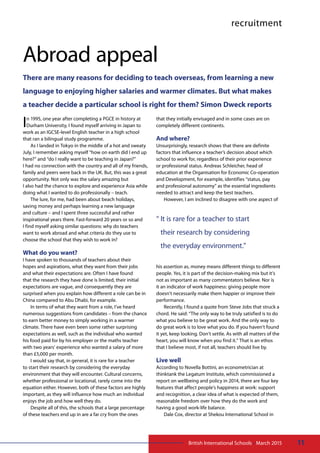Abroad Appeal
- 1. 11British International Schools • March 2015 recruitment Abroad appeal There are many reasons for deciding to teach overseas, from learning a new language to enjoying higher salaries and warmer climates. But what makes a teacher decide a particular school is right for them? Simon Dweck reports In 1995, one year after completing a PGCE in history at Durham University, I found myself arriving in Japan to work as an IGCSE-level English teacher in a high school that ran a bilingual study programme. As I landed in Tokyo in the middle of a hot and sweaty July, I remember asking myself “how on earth did I end up here?” and “do I really want to be teaching in Japan?” I had no connection with the country and all of my friends, family and peers were back in the UK. But, this was a great opportunity. Not only was the salary amazing but I also had the chance to explore and experience Asia while doing what I wanted to do professionally – teach. The lure, for me, had been about beach holidays, saving money and perhaps learning a new language and culture – and I spent three successful and rather inspirational years there. Fast-forward 20 years or so and I find myself asking similar questions: why do teachers want to work abroad and what criteria do they use to choose the school that they wish to work in? What do you want? I have spoken to thousands of teachers about their hopes and aspirations, what they want from their jobs and what their expectations are. Often I have found that the research they have done is limited, their initial expectations are vague, and consequently they are surprised when you explain how different a role can be in China compared to Abu Dhabi, for example. In terms of what they want from a role, I’ve heard numerous suggestions from candidates – from the chance to earn better money to simply working in a warmer climate. There have even been some rather surprising expectations as well, such as the individual who wanted his food paid for by his employer or the maths teacher with two years’ experience who wanted a salary of more than £5,000 per month. I would say that, in general, it is rare for a teacher to start their research by considering the everyday environment that they will encounter. Cultural concerns, whether professional or locational, rarely come into the equation either. However, both of these factors are highly important, as they will influence how much an individual enjoys the job and how well they do. Despite all of this, the schools that a large percentage of these teachers end up in are a far cry from the ones that they initially envisaged and in some cases are on completely different continents. And where? Unsurprisingly, research shows that there are definite factors that influence a teacher’s decision about which school to work for, regardless of their prior experience or professional status. Andreas Schleicher, head of education at the Organisation for Economic Co-operation and Development, for example, identifies “status, pay and professional autonomy” as the essential ingredients needed to attract and keep the best teachers. However, I am inclined to disagree with one aspect of his assertion as, money means different things to different people. Yes, it is part of the decision-making mix but it’s not as important as many commentators believe. Nor is it an indicator of work happiness: giving people more doesn’t necessarily make them happier or improve their performance. Recently, I found a quote from Steve Jobs that struck a chord. He said: “The only way to be truly satisfied is to do what you believe to be great work. And the only way to do great work is to love what you do. If you haven’t found it yet, keep looking. Don’t settle. As with all matters of the heart, you will know when you find it.” That is an ethos that I believe most, if not all, teachers should live by. Live well According to Novella Bottini, an econometrician at thinktank the Legatum Institute, which commissioned a report on wellbeing and policy in 2014, there are four key features that affect people’s happiness at work: support and recognition, a clear idea of what is expected of them, reasonable freedom over how they do the work and having a good work-life balance. Dale Cox, director at Shekou International School in “ It is rare for a teacher to start their research by considering the everyday environment.”
- 2. 12 British International Schools • March 2015 recruitment China, agrees with this in his recent PhD thesis, A Global Study of International Teacher Recruitment. His research points to seven general categories of reasoning that teachers use when selecting a new school. By far the most frequently mentioned is the relationship with the school leader, with variables in this category including how autonomous the individual would be over work and the classroom, recognition of good work, how much influence they would have over school policy and how manageable the workload would be. The school leader appears to be fundamental to a school’s chances of success in the recruitment of staff. Steve Mancuso, high school principal at the American Community School in Jordan, even goes so far as to argue that the importance of this relationship will likely increase for teachers with greater experience or who have already worked overseas. Cox’s categories also include external work conditions, professional satisfaction, personal wellbeing, professional growth, compensation and career advancement. According to Cox, his seven main factors accounted for 64 per cent of the reasons given by teachers searching for a new role. The International Schools Review website outlines a Teachers’ Charter that it believes all international schools should adhere to in order to attract education professionals. The charter includes the right to accurate information, ethical contractual practice and to work in a safe, supportive environment. Comments on the site also confirm the importance of a strong supportive Simon Dweck is head of international school services at Capita Education Resourcing. headteacher as well as the other factors mentioned in Cox’s research. Clearly, then, there are numerous elements that play a part in defining a teacher’s happiness in their role; from the relationship with the school leader to access to career advancement. Such factors are worth bearing in mind for future recruitment. Market indicators from suggest that by 2024 international schools will need to recruit 750,000 teachers. As roughly half of these are British schools, this means that there will be around 350,000 British-trained teachers needed within the next 10 years if these institutions continue to subscribe to the view that these schools must have British-trained teachers. This is a number that the existing talent pool will simply not be able to generate, especially if national teacher training trends continue to be in deficit. Even if hiring activity is adapted to appeal to what teachers want, the real issue in the long term lies in how recruitment will change to address the looming teacher shortage. Will there be more internal training developed or will schools need to look elsewhere for talent? But that’s a topic for another day. How do you attract teachers to your school?


